Related Research Articles
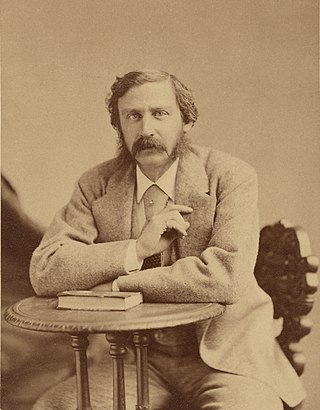
Bret Harte was an American short story writer and poet best remembered for short fiction featuring miners, gamblers, and other romantic figures of the California Gold Rush. In a career spanning more than four decades, he also wrote poetry, plays, lectures, book reviews, editorials, and magazine sketches.
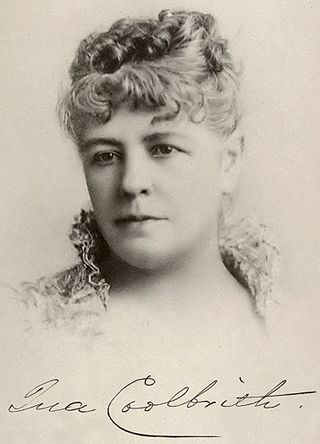
Ina Donna Coolbrith was an American poet, writer, librarian, and a prominent figure in the San Francisco Bay Area literary community. Called the "Sweet Singer of California", she was the first California Poet Laureate and the first poet laureate of any American state.
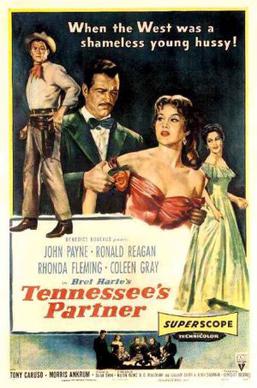
Tennessee's Partner is a 1955 American Western film, directed by Allan Dwan, written by: Graham Baker, D.D. Beauchamp, Milton Krims and Teddi Sherman, with uncredited rewrites by Dwan, and starring: John Payne, Ronald Reagan, Rhonda Fleming and Coleen Gray.

"The Outcasts of Poker Flat" (1869) is a short story written by author of the American West Bret Harte. An example of naturalism and local color of California during the first half of the nineteenth century, the story was first published in January 1869 in the magazine Overland Monthly. It was one of two short stories which brought the author national attention.
The Golden Era was a 19th-century San Francisco newspaper. The publication featured the writing of Mark Twain, Bret Harte, Charles Warren Stoddard, Fitz Hugh Ludlow, Adah Isaacs Menken, Ada Clare, Prentice Mulford, Dan De Quille, J. S. Hittell and some women such as Frances Fuller Victor. Stoddard recalled the newspaper as "the chief literary organ west of the Rocky Mountains".
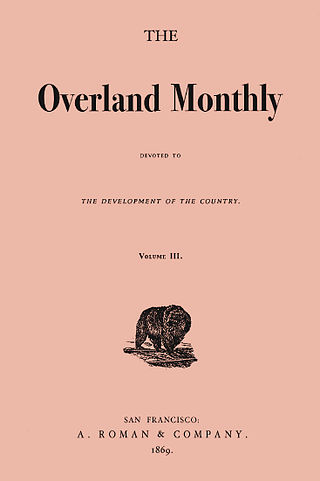
The Overland Monthly was a monthly literary and cultural magazine, based in California, United States. It was founded in 1868 and published between the second half of the 19th century and the first half of the 20th century.

Mark Twain's legacy includes awards, events, a variety of memorials and namesakes, and numerous works of art, entertainment, and media.

James Ripley Osgood (1836–1892) was an American publisher in Boston. He was involved with the publishing company that became Houghton Mifflin.

"The Heathen Chinee", originally published as "Plain Language from Truthful James", is a narrative poem by American writer Bret Harte. It was published for the first time in September 1870 in the Overland Monthly. It was written as a parody of Algernon Charles Swinburne's Atalanta in Calydon (1865), and satirized anti-Chinese sentiment in northern California.

Josephine Clifford McCracken (1839–1921) was a California writer and journalist, a contemporary of Bret Harte, John Muir, Ina Coolbrith, and Joaquin Miller, and an environmentalist. She was a member of the Pacific Coast Women's Press Association.

"The Luck of Roaring Camp" is a short story by American author Bret Harte. It was first published in the August 1868 issue of the Overland Monthly and helped push Harte to international prominence.

The Flaming Forties is a 1924 American silent Western film, the sixth of seven features which short-lived motion picture company Stellar Productions released in 1924–1925 as Producers Distributing Corporation vehicles for Harry Carey. Carey was primarily known as a star of Westerns and only one of the seven films did not fit into that genre. Assigned as director was 31-year-old Tom Forman, who less than two years later, in November 1926, died from a self-inflicted gunshot wound.
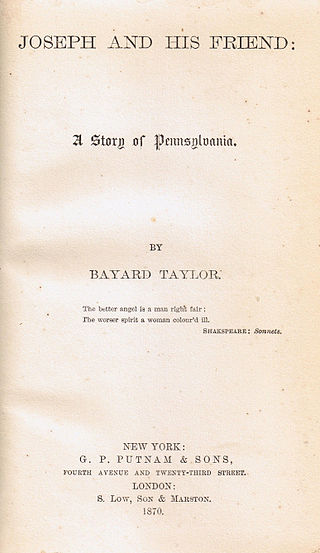
Joseph and His Friend: A Story of Pennsylvania is an 1870 novel by American author Bayard Taylor, a prolific writer in many genres. It presented a special attachment between two men and discussed the nature and significance of such a relationship, romantic but not sexual. Critics are divided in interpreting Taylor's novel as a political argument for homosexual relationships or an idealization of male spirituality.
Rabboni was a steam tug that operated on the west coast of the United States starting in 1865.
The Tales of the Argonauts is a volume of short stories published by Bret Harte in 1875. The title is sometimes loosely applied to all Harte's stories of early California.

Tennessee's Pardner is a surviving 1916 American Western film directed by George Melford, written by Marion Fairfax, and starring Fannie Ward, Jack Dean, Charles Clary, Jessie Arnold, Ronald Bradbury, and Raymond Hatton. It was released February 6, 1916, by Paramount Pictures.
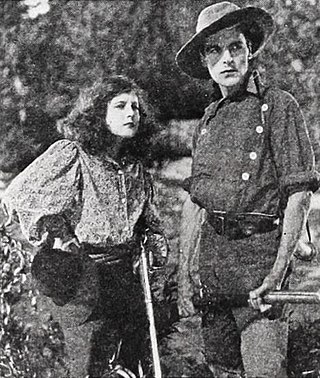
The Golden Princess is a 1925 American silent Western film directed by Clarence G. Badger and written by Frances Agnew based upon an 1869 story by Bret Harte. The film stars Betty Bronson, Neil Hamilton, Phyllis Haver, Joseph J. Dowling, Edgar Kennedy, George Irving, and Norma Wills. The film was released on October 5, 1925, by Paramount Pictures.
William Chauncey Bartlett (1818–1907) was an American writer, born December 30, 1818, in Haddam, Connecticut. He attended Williams College, and Ohio University in 1847. He was admitted to Ohio bar, and was a law partner of Hiram Strong in Dayton, Ohio from 1848 to 1855. In 1855 he joined the staff of the Dayton Gazette. In 1857 he preached against slavery in Indianapolis, Indiana.

Netta Eames was born Ninetta Wiley, in Wisconsin on September 26, 1852. She is commonly known as Netta. She is best known as a writer and magazine editor in the late 1800s and early 1900s. As the editor of the San Francisco based Overland Monthly magazine, she became an early proponent of Jack London as a writer. She wrote the 1900 biography and a promotional biography of London in Overland Monthly in 1900, which helped to establish his career. Later she was his business manager and neighbor.

Two Men of Sandy Bar is a 1916 American silent Western Melodrama directed by Lloyd B. Carleton and starring Hobart Bosworth, Gretchen Lederer along with Emory Johnson.
References
- ↑ Scofield, Martin (2006-09-14). The Cambridge Introduction to the American Short Story. Cambridge University Press. pp. 55–. ISBN 9781139457651 . Retrieved 9 November 2014.
- ↑ Coates, Frank (1 January 1934). "The early history of Tuolumne County, California". Theses and Dissertations. University of the Pacific (United States): 139. Retrieved 8 January 2023.
- ↑ Brockman, C. Frank (1948). "A Guide to the Mother Lode Country". Yosemite Online. Dan Anderson. Retrieved 8 January 2023.
- ↑ "Near Sonora, Calif. Jany 15/32. "Bret Harte's Cabin, Home of Tennessee's Pardner."". calisphere .
- ↑ Scherer, Logan (3 September 2019). "Bedfellows Forever, Male romantic friendships in art and life". Oxford American. No. 106. Retrieved 7 November 2023.
- ↑ Overland Monthly vol. 3 at Google Books
- ↑ New Eclectic Magazine 1869 at Google Books.
- ↑ Review of the collection in the Lakeside Monthly, June 1870: "They are all scenes from what it is common in cities to denominate "low life" ... "Miggles" and "Tennessee's Partner" are pictures of affection – the one of the purity of woman's love, the other of the devotion of man's friendship – and both illustrated by the grotesque characters of this low life of which we have spoken."
- ↑ Review of the collection in the Atlantic Monthly, May 1870: "We suppose women generally would not find his stories amusing or touching, though perhaps some woman with an unusual sense of humor would feel the tenderness, the delicacy, and the wit that so win the hearts of his own sex. ... We think it probable that ... a man only could relish the rude pathos of Tennessee's partner"
- ↑ Review of the collection in Blackwood's Edinburgh Magazine, Oct. 1871: "None of the other short stories in the volume are equal to "Roaring Camp," though "Tennessee's Partner," the "Man of no Account," and the "Idyll of Red Gulch," are all very striking, and show the writer's power of bringing out true human nature, tenderness, and moral beauty out of the saddest wrecks and fragments of humanity. We cannot refrain from quoting an unsuccessful attempt on the part of Tennessee's partner to rescue his principal from the hands of Judge Lynch, who had caught and convicted him of aggravated highway robbery, and was about to hang the culprit. ..."
- ↑ Every Saturday, Volume 2 at Google Books.